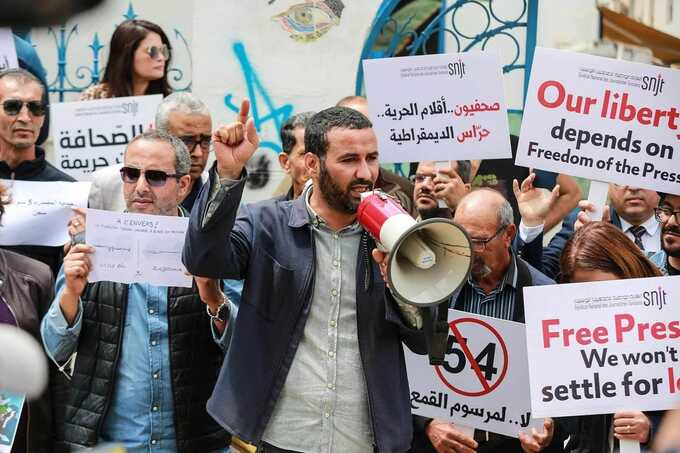On Thursday, Houssem Hajlaoui, co-founder of the independent news website Inkyfada, was handed a nine-month suspended sentence for Facebook posts critical of police and politicians.
The previous day, a judge in the capital, Tunis, sentenced two reporters with the private radio station IFM to prison for one year each. Borhen Bssais and Mourad Zghidi were convicted of defamation and spreading false news.
The convictions follow the arrests this month of about 10 journalists, lawyers and civil society advocates in the North African country. The International Federation of Journalists said at least 30 reporters were arrested last year.
Bssais and Zghidi were convicted under Decree 54, which was signed into law by Saïed in 2022. The decree punishes the dissemination of “false news” with the intent to harm or defame others.
Critics have argued that the Saïed government has used the law against legitimate journalism, freedom of speech, and the legal system. During their trials, both Bssais and Zghidi reportedly said they were being targeted for practicing normal journalism.
“Saïed has dismantled Tunisia’s democratic institutions, undermined judicial independence, and stifled the exercise of freedom of expression and the press,” Human Rights Watch said in a statement.
Saïed defended his government’s actions in a May 16 Facebook post following the arrests of two lawyers, stating that Tunisian law “guarantees equality and the right to a fair trial.”
The post was widely assumed to refer to Sonia Dahmani, a lawyer and political affairs commentator for IFM who was arrested May 11, and Mehdi Zagrouba, who was arrested May 13. Zagrouba was charged for “contempt against a public official” and allegedly assaulting a police officer during a protest against Dahmani’s detention.
“What has happened in recent days is not about the lawyer, but about those who dared to humiliate their country in the media, and those who violently assaulted a security officer,” Saïed said in his Facebook post.
Many analysts and activists, however, see this month’s spate of arrests as only the most recent episode in a continuing assault on democracy and human rights under Saïed’s government.
The International Crisis Group (ICG) says Saïed has “concentrated power in his own hands,” through changes in the law, as well as jailing political opponents and others.
Those measures followed what is widely referred to as Saïed’s “self coup” in 2021, when he replaced the “semi-parliamentary system with a presidential one that arrogates almost all government authority to himself,” ICG said.
The latest round of arrests is intended to silence dissent in the run-up to elections scheduled for Autumn –– the first since the “self coup” –– according to human rights activist Kamel Jendoubi.
“This repressive outburst aims to prepare for the next presidential elections,” he told OCCRP. “There is a cold strategy put in place, in the service of the current president, by the repressive apparatus which has never been reformed.”
Jendoubi accused Saïed of pushing the country back into the authoritarian days of former president Zine El Abidine Ben Ali, who was overthrown in 2011 after 24 years in power.
“These are the practices of Ben Ali –– only worse,” said Jendoubi.



































